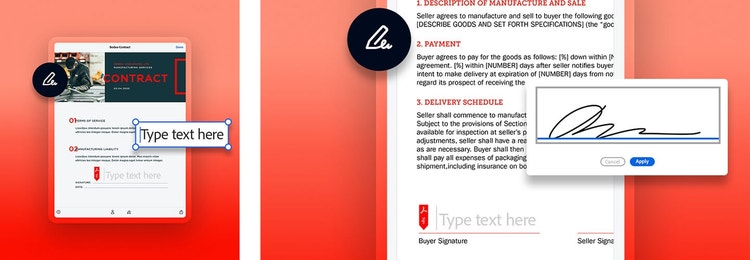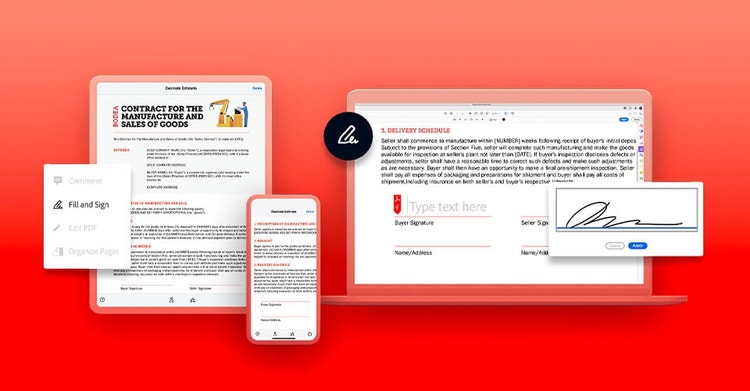ADOBE ACROBAT
How to write contract agreements
Discover the faster, easier way to get binding signatures on your business contract.

What is a contract?
A contract is a binding and enforceable agreement between two or more parties. When parties sign a written agreement or binding contract, they voluntarily agree to act according to the rights and obligations defined in the document. Oral agreements may be fine for small transactions, but everyone can usually benefit from putting a contract in writing. Written contracts can ensure that your interests and other parties’ obligations are enforceable, and the contract can spell out solutions if the legal contract is broken.

Some types of contracts.
Contracts help to formalize an agreement. These are some common types of contracts:
Sales contracts.
Every sale can be seen as a contract between the buyer and seller. The buyer promises to pay for a property or service (such as intellectual property like music or images), and the seller promises to transfer ownership of that property or provide the purchased good or perform the purchased service. Examples of sales contracts include a promissory note, a bill of sale, a warranty or security agreement, and a purchase order.
Employment contracts.
These contracts relate to the terms of employment, including services for hire from freelancers, consultants, small businesses, or other independent contractors. These types of contracts may also contain termination agreements in case the employee’s employment is terminated, as well as nondisclosure agreements (NDAs) and confidentiality clauses, which protect confidential information.
General business agreements.
These types of agreements can cover all different aspects of doing business, such as partnership formation, business owners, capital investment, and the sale or purchase of stock. NDAs, indemnity agreements, or waivers of rights are also usually considered business agreements.
Settlement agreements.
Parties to a dispute might agree to a settlement to avoid going to court. The terms of the settlement are often set out in a settlement agreement signed by the parties.
Property contracts.
These types of contracts include leases for commercial, retail, residential, and parking spaces. They often can cover details like maintenance expectations, requirements like tenant insurance, the amount of a security deposit, and the terms and conditions for the return of the property upon completion of the lease.

Elements of a contract agreement.
Before entering into a contract, all parties should clearly state their intention to enter into the contract and their agreement to every part of the contract. Each party must also have capacity, which means the parties have the requisite ability to understand the terms and obligations detailed in the contract. If one of the parties is a minor, has a disability that prevents them from understanding the terms, or is intoxicated, then that party may then lack the capacity to sign the contract.
Some other important features of contracts include:
- Basic information: Legal names and/or business names of the involved parties, their addresses, and a description of the property or service being exchanged for money or other consideration.
- Rights and Obligations: This is a statement of the terms of the contract, such as the rights and responsibilities of all involved parties.
- Specific considerations: This is a more detailed description of the property and/or terms, like the condition of the item, what the parties will and will not be responsible for, and what, if any, warranty or guarantees exist.
- Dates: Agreement should note any important dates, such as date of sale, dates for any warranties in effect, and due dates for payment installments, if any.
- Termination: This section explains the different termination rights, if any, of the parties and what happens after termination.
- Signatures: It should be clear where all contracted parties must sign and/or initial. All parties should receive and retain a completed copy of the contract for their records.

Things to consider before you sign.
Get legal advice.
Contract law is complicated and full of nuance and, sometimes, legalese. Before you finalize a contract for your business, To create a contract, finalizing a contract or before signing a contract you should speak to an attorney for advice.
Be prepared to haggle.
Negotiation is a natural part of any business relationship. Prepare to negotiate the terms of your contract. Know where you have room to give and where you have to stand firm.
Seal the deal.
Complete binding contracts more quickly, securely with Adobe Acrobat Pro. You can create fillable forms based off of your contract templates that you can send and get signed electronically.

Learn more about the benefits of digital workflows.
Find out how the Adobe legal and government relations teams reduced paperwork and sped up contract completion and accuracy with Adobe Acrobat Pro. By creating preapproved contract templates and establishing efficient workflows, these teams were able to shorten contract completion time by 73 percent.
